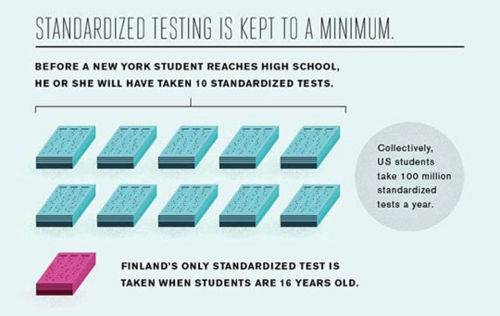Whatever national standards emerge from the current debates, simple facts are actually only a small part of what people need to know. We are rapidly developing into a world where anybody can have access to answers via cell phone and Internet, wirelessly, with the stroke of a touch-screen.
Thus, no matter how easy it is to bubble in fact-answers on a computerized answer sheet, our essential education standards for the 21st century have to reflect a different reality. Skill-sets are far more vital to our future prosperity than fact-sets, and the most essential of all skill-sets are the cognitive skills.
We need above all to be teaching our students to THINK CRITICALLY.
However, if there is one “single-worst” failing I’ve observed in the schools with which I’ve been associated over the years, it is that thinking—sharp-eyed, well-informed, critical thinking—is not given remotely enough attention in schools.
The reasons for this are mostly practical, ironically enough. As noted above, it’s easier to test fact-regurgitation than it is to test thinking processes or evaluate the quality of a student’s logic. But that’s only a small part of the problem.
Teaching a person to think causes lots of trouble in a contemporary school setting. For one thing, it requires time. It’s a messy process, requiring an adult to engage one-on-one or in small groups for fairly extended periods of time, doing a lot of free-form exploration. A teacher with 27 teenagers in one classroom can’t do it consistently. A teacher with 20 Kindergarteners is just as hard-put.
I remember being taught in a professional development series how to use a variety of “classroom structures” to engage students in cooperative learning. We were given the advice that, while students need “think time” to respond to prompts, the wise teacher will hold those snippets of “think time” down to 30 seconds to two minutes at the most.
Sure, I thought ruefully.
Anybody can think deep thoughts in 30 seconds to two minutes. Ri-i-i-ight.Teaching a person to think also requires creativity, on the part of both the student and the teacher. I believe many teachers are innately creative, but that doesn't necessarily mean they are very self-actualized in this area. Most teachers were themselves poorly taught to be creative, and often seem afraid to let their students' creativity blossom fully.
Creativity itself is a messy, unpredictable process, even when handled well. It rarely fits comfortably into the narrow confines of a 40-minute class period, and often results in more noise and physical activity than many educators are comfortable tolerating.
But the most difficult part of teaching students to think is that once you’ve taught them how, and told them it's a good thing to do--they’ll tend to
do it! This causes all kinds of problems for schools.
When a critical thinker bumps up against something that doesn’t seem to make sense, s/he questions it. Unfortunately, there are so many rules and procedures land-mining the typical school day that really don’t make any sense from the student’s point of view, it takes almost no time for critical thinkers to become questioners of authority.
You can see what a horrifying prospect that is. No efficiently run human-warehousing institution happily tolerates questioners of authority. Moreover, controlling imaginative, independent thinkers (not to mention staying at least one jump ahead of them and keeping them engaged) is much harder than controlling and knowing more than a group of compliant conformists who all think alike, and don’t think very hard.
If you buy into the “teacher must always know more than the student” fallacy, or if you are an ardent devotee of straight rows of desks and pin-drop silence in the classroom, then you very clearly don’t want imaginative, critical thinkers occupying those desks! I am here to tell you that contemporary US taxpayers, politicians, and educators all cherish the ideal of quiet, orderly schools, headed by highly-qualified teachers who can pour standardized wisdom into the supposedly-empty heads of their students, who will therefore score above proficient levels on their standardized tests. It is literally an official mandate.
And that's why I say our current schools aren't set up to teach and support the most vital skill needed by students who hope to thrive in the 21st century.









